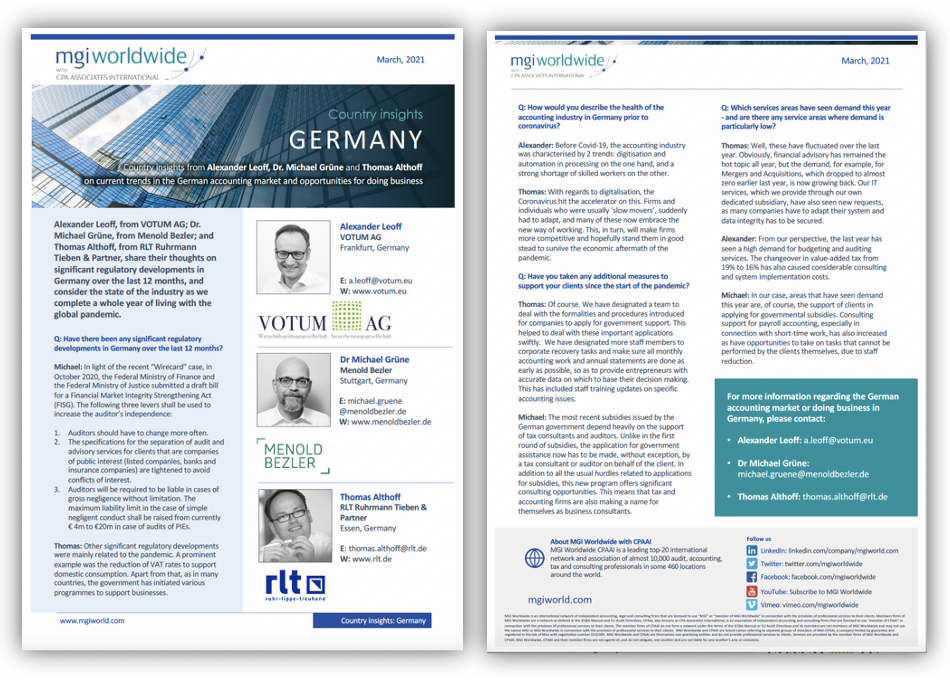Country insights: Germany – MGI Worldwide CPAAI member firms in Germany share thoughts on the accounting industry and the shift in service demand due to the pandemic
Alexander Leoff, from VOTUM AG; Dr. Michael Grüne, from Menold Bezler; and Thomas Althoff, from RLT Ruhrmann Tieben & Partner, share their thoughts on significant regulatory developments in Germany over the last 12 months and consider the state of the industry as we complete a whole year of living with the global pandemic.
Q: Have there been any significant regulatory developments in Germany over the last 12 months?
Michael: In light of the recent “Wirecard” case, in October 2020, the Federal Ministry of Finance and the Federal Ministry of Justice submitted a draft bill for a Financial Market Integrity Strengthening Act (FISG). The following three levers shall be used to increase the auditor’s independence:
- Auditors should have to change more often.
- The specifications for the separation of audit and advisory services for clients that are companies of public interest (listed companies, banks and insurance companies) are tightened to avoid conflicts of interest.
- Auditors will be required to be liable in cases of gross negligence without limitation. The maximum liability limit in the case of simple negligent conduct shall be raised from currently € 4m to €20m in case of audits of PIEs.
 Thomas: Other significant regulatory developments were mainly related to the pandemic. A prominent example was the reduction of VAT rates to support domestic consumption. Apart from that, as in many countries, the government has initiated various programmes to support businesses.
Thomas: Other significant regulatory developments were mainly related to the pandemic. A prominent example was the reduction of VAT rates to support domestic consumption. Apart from that, as in many countries, the government has initiated various programmes to support businesses.
Q: How would you describe the health of the accounting industry in Germany prior to coronavirus?
Alexander: Before Covid-19, the accounting industry was characterised by 2 trends: digitisation and automation in processing on the one hand, and a strong shortage of skilled workers on the other.
Thomas: With regards to digitalisation, the Coronavirus hit the accelerator on this. Firms and individuals who were usually ‘slow movers’, suddenly had to adapt, and many of these now embrace the new way of working. This, in turn, will make firms more competitive and hopefully stand them in good stead to survive the economic aftermath of the pandemic.
Q: Have you taken any additional measures to support your clients since the start of the pandemic?
Thomas: Of course. We have designated a team to deal with the formalities and procedures introduced for companies to apply for government support. This helped to deal with these important applications swiftly. We have designated more staff members to corporate recovery tasks and make sure all monthly accounting work and annual statements are done as early as possible, so as to provide entrepreneurs with accurate data on which to base their decision making. This has included staff training updates on specific accounting issues.
Michael: The most recent subsidies issued by the German government depend heavily on the support of tax consultants and auditors. Unlike in the first round of subsidies, the application for government assistance now has to be made, without exception, by a tax consultant or auditor on behalf of the client. In addition to all the usual hurdles related to applications for subsidies, this new program offers significant consulting opportunities. This means that tax and accounting firms are also making a name for themselves as business consultants.
Q: Which services areas have seen demand this year - and are there any service areas where demand is particularly low?
Thomas: Well, these have fluctuated over the last year. Obviously, financial advisory has remained the hot topic all year, but the demand, for example, for Mergers and Acquisitions, which dropped to almost zero earlier last year, is now growing back. Our IT services, which we provide through our own dedicated subsidiary, have also seen new requests, as many companies have to adapt their system and data integrity has to be secured.
Alexander: From our perspective, the last year has seen a high demand for budgeting and auditing services. The changeover in value-added tax from 19% to 16% has also caused considerable consulting and system implementation costs.
Michael: In our case, areas that have seen demand this year are, of course, the support of clients in applying for governmental subsidies. Consulting support for payroll accounting, especially in connection with short-time work, has also increased as have opportunities to take on tasks that cannot be performed by the clients themselves, due to staff reduction.
Click HERE to view the full Country Insight
Menold Bezler, RLT Ruhrmann Tieben & Partner, and VOTUM AG, are members of MGI Worldwide CPAAI. For further information contact:
- Menold Bezler - profile page HERE and firm website HERE.
- RLT Ruhrmann Tieben & Partner - profile page HERE and firm website HERE.
- VOTUM AG profile page HERE and firm website HERE
MGI Worldwide with CPAAI is a top 20 ranked global accounting network and association with almost 10,000 independent auditors, accountants and tax experts in some 460 locations in over 100 countries around the world.

